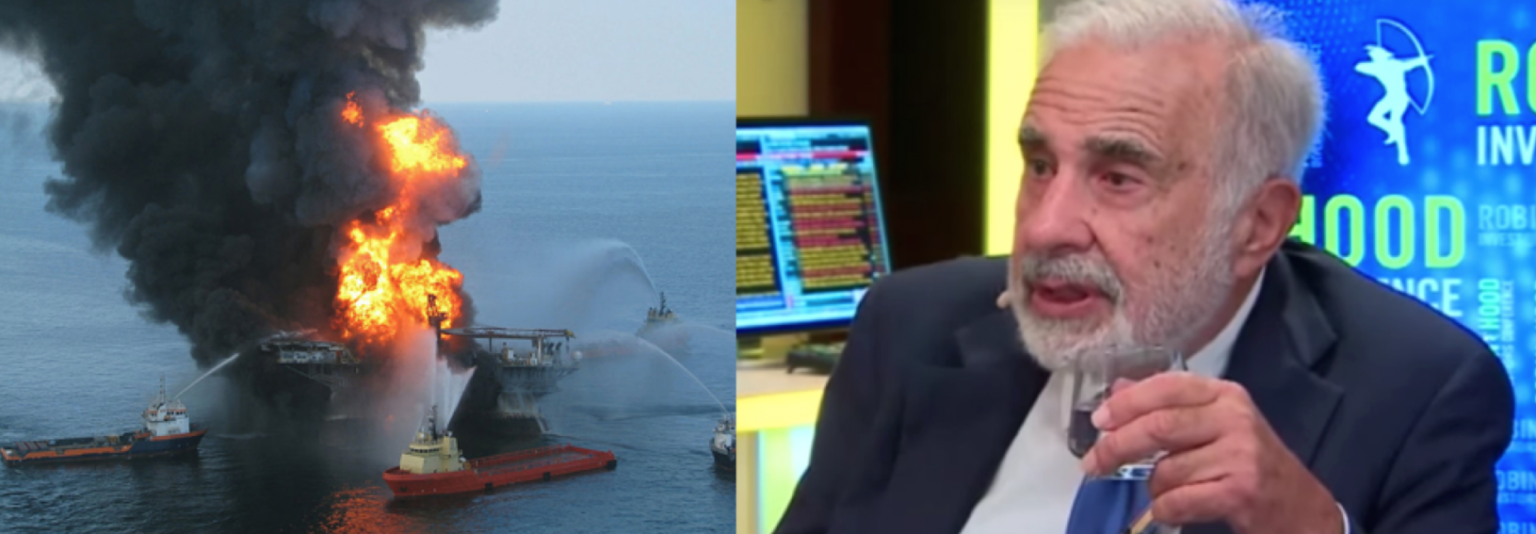In a recent “Victory Tour” speech in Des Moines, Iowa, President-elect Donald Trump told the audience that he sought to pick a Cabinet and team of advisors composed of “people that made a fortune” because “now they’re negotiating with you, OK?”
Carl Icahn, the 26th richest man on the planet according to Forbes, fits the “made a fortune” bill. Icahn, a business partner of Trump and major donor to his presidential campaign, has been named by the President-elect as his Special Advisor on Regulatory Reform.
However, as recently reported by DeSmog, Icahn stands to gain directly from deregulation in the energy and environmental sphere. He has already made his mark on the future Trump administration by vetting and recommending the regulation-averse Scott Pruitt, whom Trump eventually picked to head the U.S. Environmental Protection Agency (EPA).
To get a taste for Icahn’s approach to business, look no further than his holding company, Icahn Enterprises, which bought the Atlantic City Trump Taj Mahal out of bankruptcy in 2014 and then decided to close it down rather than meet the demands of striking workers
Icahn Enterprises owns a controlling stake in the petroleum refining company CVR Energy and its subsidiary CVR Refining, both of which have a long track record of EPA violations. The two companies own the Wynnewood Refining Company in Wynnewood, Oklahoma, which receives some carbon-intensive tar sands oil from the Keystone Pipeline System owned by TransCanada.
Beyond CVR, Icahn also owns large stock-holding stakes in hydraulic fracturing (“fracking”) giant Chesapeake Energy and the fracked gas exporting companies Cheniere and Freeport-McMoran, as well as in the offshore oil and gas drilling company TransOcean. Transocean was the driller responsible for the catastrophic BP Deepwater Horizon oil spill in the Gulf of Mexico in 2010.
“Individual Capacity”
Trump made an official statement on the Icahn hire. In it, his transition team said Icahn will be serving in an “individual capacity” and will continue to own and operate Icahn Enterprises as his full-time job.
“Carl was with me from the beginning and with his being one of the world’s great businessmen, that was something I truly appreciated,” Trump said in the statement. “He is not only a brilliant negotiator, but also someone who is innately able to predict the future especially having to do with finances and economies. His help on the strangling regulations that our country is faced with will be invaluable.”
Icahn was also given a chance to offer a first take on how he sees his new role in the looming Trump White House.
“Under President Obama, America’s business owners have been crippled by over $1 trillion in new regulations and over 750 billion hours dealing with paperwork,” said Icahn in the Trump press statement. “It’s time to break free of excessive regulation and let our entrepreneurs do what they do best: create jobs and support communities. President-elect Trump is serious about helping American families, and regulatory reform will be a critical component of making America work again.”
Conflicts of Interest? Icahn Says That’s “Crazy”
Critics of Icahn landing this job in the Trump administration have raised the issue of his numerous potential conflicts of interest, which seems to be the rule rather than the exception among Trump’s White House team.
“It is very disconcerting and troubling to people who take investor protection issues seriously,” Andrew Stoltmann, a partner at securities law firm Stoltmann Law, told USA Today. “It’s a little like asking the fox to guard the hen house.”
Unhappy about the analogy, Icahn responded on CNBC and called it a “crazy” comparison, dismissing concerns about conflicts of interest. In that interview, Icahn also directly addressed his involvement with CVR Energy.
“I would ask you, should Jamie Dimon be discussing banking regulations because he’s also the CEO of JP Morgan?,” said Icahn in response to a question about his ownership stake in CVR. “I mean, it’s almost a crazy issue if you think of it that way. You know, I can understand saying that I shouldn’t be involved in owning these if I were making policy, as is true of Cabinet members that are really making policy.”
Since first reported that Icahn was interviewing Cabinet nominees on Trump’s behalf, including the climate change-denying Pruitt, CVR Energy’s stock price has risen from $16.75 per share to $23.69 per share. The Wall Street Journal reported that Icahn has made over $600 million dollars on CVR stocks since this past election day, a 67-percent rate of return.
Many believe Pruitt, who currently serves as Attorney General of Oklahoma and lists being a “leading advocate against the EPA’s activist agenda” in his official biography, would likely reduce the number of violations and fines slapped against Icahn’s companies and other companies.
Icahn Enterprises has also seen its stock rise from $42.93 per share on election Day to $56.01per share as of publishing time for this article, a 76-percent return on investment.
Katrina Vanden Huevel, Editor-in-Chief of The Nation Magazine, was quick to point out Icahn’s potential to act in his own financial, rather than the public, interest in a comment on Twitter.
How many more billionaires can Trump fill the swamp with? Carl Icahn to regulate how his own industry is regulated.
— Katrina vandenHeuvel (@KatrinaNation) December 21, 2016
Photo Credit: DeSmog
Subscribe to our newsletter
Stay up to date with DeSmog news and alerts






